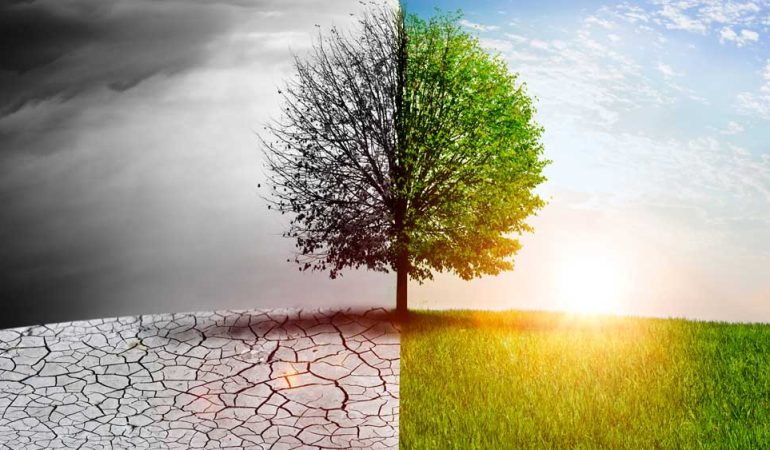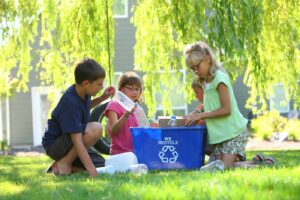
Being an Active Citizen for Climate Change
Course Description
In recent years, the deterioration of the ecosystem with anthropogenic effects and accordingly environmental events such as global warming, greenhouse effect, depletion of the ozone layer and climate changes have increased rapidly. Parallel to this, it has become an increasingly common view that education is the leading solution for raising environmental awareness. In particular, raising individuals at the desired level in solving environmental problems that concern all societies can only be realized with the importance given to environmental education. Environmental problems do not concern only one region of our planet or a particular country, but the whole world. Therefore, environmental education becomes an integral part of the education program of every country.
Climate change and global warming have become concepts that we have started to use in our daily lives. At the same time, global warming refers to the increase in minimum temperatures rather than the increase in daily, monthly and annual maximum temperatures. Today, as a result of global warming and people’s more intense use of natural resources, environmental problems have increased to a great extent. The relations between man and nature started to deteriorate gradually, and as a result, discussion of environmental problems came to the fore.
In this context, environmental awareness should be created in every individual in order to act on our individual responsibilities to be a responsible global citizen. Of course, the first places where this awareness will occur should be schools. This course, which is prepared to meet the needs of teachers and students in schools, offers effective solutions for the formation of individual awareness.
Course Methodology:
The course employs a combination of theoretical knowledge, practical activities, and interactive sessions to ensure a comprehensive understanding of climate change and the role of education in fostering environmental awareness. The methodology aims to engage participants actively, encouraging them to apply the acquired knowledge in real-world scenarios, particularly within the context of educational settings.
Course Objectives:
Understanding Climate Change:
- Gain an in-depth understanding of climate change, its global impact, and the various environmental issues associated with it.
- Explore the effects of climate change on ecosystems, weather patterns, and human societies.
Taking Action Against Climate Change:
- Identify actionable steps and lifestyle changes that individuals can adopt to mitigate the impact of climate change.
- Foster a sense of responsibility and empowerment in participants to contribute positively to environmental sustainability.
Global Initiatives and Solutions:
- Examine the United Nations’ Sustainable Development Goals (SDGs) and the European Union’s climate crisis actions.
- Develop strategies to integrate and enhance existing global initiatives at the local school level.
Climate Literacy Awareness:
- Equip participants with the knowledge and tools to enhance climate literacy among students.
- Provide practical activities and resources for effectively conveying climate-related concepts to diverse audiences.
Curriculum Integration:
- Explore methods to incorporate climate change issues into school curricula across various subjects.
- Develop interdisciplinary climate curricula that align with educational standards and engage students in meaningful ways.
Student-Centered Learning:
- Introduce student-centered tools and methodologies for teaching climate change.
- Empower educators to create an interactive and participatory learning environment that fosters critical thinking and problem-solving skills.
The course methodology and objectives aim to empower educators to instill a sense of environmental responsibility in students, fostering a generation capable of addressing and mitigating climate change challenges.
COURSE SCHEDULE
1st Day
- Meeting, warm-up and trust activities for effective and positive interaction during the course
- Climate change in the world, the effects of climate change
- What to do against climate change, how to live
2nd Day
- UN’s Sustainable development goals and solution proposals
- EU’s climate crisis actions and solution proposals
- Adding new strategies to the UN and EU’s solution proposals on climate action and transferring them to the school
- Being able to recognize the effects of the UN and EU’s climate change actions on their students’ own lives.
3rd Day
- Climate literacy awareness
- Informing students about their carbon footprints and developing new methods to bring it to the classroom
- Practical activities for students to become climate literate.
4th Day
- Incorporating climate change issues into the school curriculum
- Creating an interdisciplinary climate curriculum in schools
- Developing climate change in schools with student-centered tools
5th Day
- Examples to create effective climate change awareness in schools
- Course evaluation: discussion and evaluation of acquired competencies, feedback and course content
- Sharing course documents and records
- Issuance of the Course Participation Certificate
Course Info
- Duration: 5 Days
- Location: Antalya
- Cost: €80-Day
- Certificate: Yes
- Prerequisites: No













